Neil Lennon: Celtic manager's decade as a boss in 10 moments
- Published
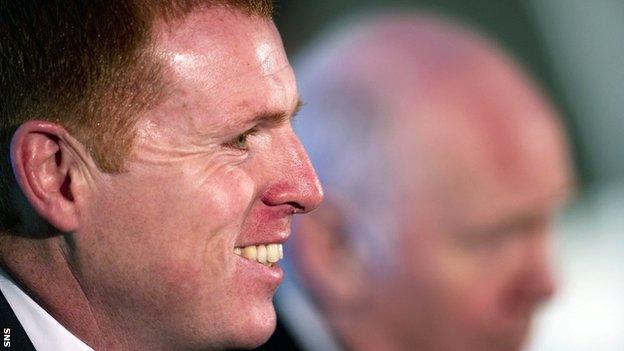
Neil Lennon was appointed pemanent Celtic manager for the first time in 2010
When Neil Lennon became permanent manager of Celtic exactly a decade ago, he didn't get the fanfare of his predecessor, Tony Mowbray, or of his successor, Ronny Deila.
His appointment could not hold a candle to the hubbub that greeted those guys and the sheer pandemonium that was sparked by the arrival of Brendan Rodgers in 2016.
Everything was more low-key when Lennon got the job. Brought in to fire-fight as Mowbray's reign went up in flames after a 4-0 loss to St Mirren, he was sent for again when Celtic were in distress after Rodgers upped and left for Leicester last year. Twice they've called on him in difficult moments and twice he's answered.
His years in charge have run the gamut of emotions, from joy to despair, from pride to fury, to fear of the bigots who have targeted him. No manager in the history of Scottish football has had to tolerate the abuse that has come at Lennon. Nobody, you fancy, would have been able to push back that sectarian hate the way he has. Lennon endures, a decade after his management days began.
Capturing his Celtic years in 10 moments is not easy. Twenty would be easier, and you could do 30 and more. But 10 it is.
The blast
Lennon has throttled back on the rants in recent times - he's a much calmer figure now - but when he went for it in the past, he was a sight to behold: a quote machine.
Perhaps his greatest eruption was the one after Celtic lost dismally to Ross County, external in the Scottish Cup semi-final in April 2010. His blast was almost a work of art.
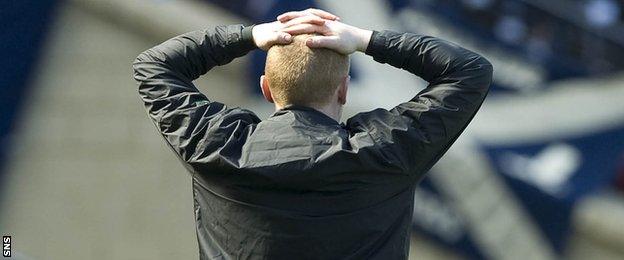
Lennon's first visit to Hampden as a manager was not a happy one
In decrying how Celtic had gone out of every competition "with a whimper", he was articulating the frustration of a man who feared that his prospects of getting the job on a permanent basis had just suffered a terminal blow.
Nobody was in any doubt about his desperation to become Celtic's next manager. To this day, the sight of the Celtic players eventually emerging from the dressing room remains vivid. They looked like they'd just encountered a Rottweiler.
The Euro low
The losses to Cluj and Copenhagen this season were damaging, but the annihilation by Utrecht in the Europa League in Lennon's early days was a very sobering lesson, and one from which he learned.
It was August 2010 and Ricky van Wolfswinkel ran amok. Celtic lost 4-0 and Lennon was forced to substitute Scott Brown before the captain got himself sent off, such was his crankiness at everything collapsing around his ears.
On the back of Braga putting Celtic out of the Champions League weeks earlier - and with the Ross County loss still fresh in the memory - these were tricky times for Lennon. There were doubts about his ability to manage the club in big games.
That feeling persisted. Celtic lost the Scottish League Cup final to Rangers - avenging that painful defeat in the 2019 version must have been sweet for him - and then got done 3-2 in Inverness in the run-in for the title, a race they lost by a point. The Scottish Cup win, external was some consolation.
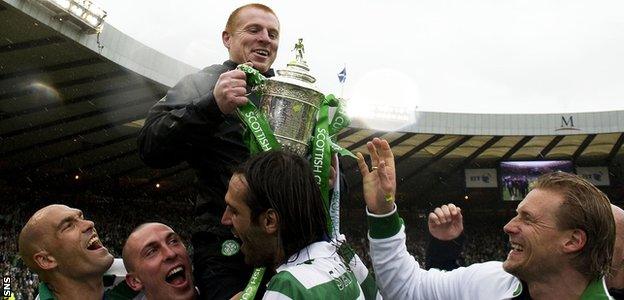
Celtic beat Motherwell 3-0 in the 2011 Scottish Cup final
The attack
Another image, from April 2011, is easy to recall. In the days leading up to the final Old Firm game of the league season, Lennon - and other prominent Catholics with Celtic affiliations - came under attack with bullets being sent in the post and the contents of a viable parcel bomb intended for the Celtic manager being intercepted at a sorting office in Saltcoats.
Lennon had to put up with sectarian abuse during his playing career but this was on an entirely different level.
The story shocked all the right-thinking people in this country and beyond. On the day the news broke, Lennon sat in his office just inside the main door of Celtic Park and exuded calm even though his concern must have run deep.
Even as he was chatting, his family were being moved to a safe house. It was a shameful episode, every bit as disturbing now as it was then.
The night at Tynecastle
A month after getting bullets in the post, Lennon was attacked once again, this time physically, while standing on the touchline at Tynecastle during a Hearts v Celtic match. A man ran to Lennon and assaulted him. Once more the Scottish game convulsed. Once more Lennon was the victim.
His attacker got eight months in prison for breach of the peace and served half of that time. Later, Lennon spoke of his disappointment that more wasn't made of the crime.
"Do I feel let down? Yes," he said. "I feel let down by certain quarters of the media. It seemed to get to the point where the attitude was, 'it's Neil Lennon, he brings it on himself', all that kind of crap... Everybody refers to Scotland's shame but not a lot of people did a lot about it."
It wouldn't be the last time Lennon was targeted at Tynecastle.
The great escape
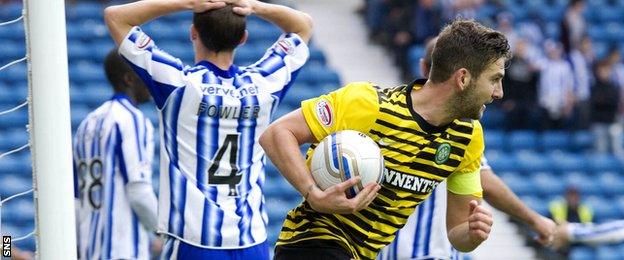
Charlie Mulgrew rescued a point for Celtic against Kilmarnock in 2011
The early months of the 2011-12 season were not easy for Lennon. By mid-October, Celtic had already lost to St Johnstone, Rangers and Hearts in the league and were in third place, fully 10 points adrift of the Ibrox club. On a mammoth day at Rugby Park, they trailed 3-0 to Kilmarnock at half-time and Lennon looked well and truly doomed. The supporters were vicious. The backlash was severe.
Had they lost that game, it might have been the end of him there and then, but they fought back and scored three late goals in seven minutes to draw 3-3.
Charlie Mulgrew's 80th-minute equaliser might have saved Lennon's bacon. They didn't lose another domestic match for five months and won the title. Killie took revenge and beat them in the League Cup final.
Cups were often problematic for Lennon. Ross County, Killie, Hearts, Aberdeen, St Mirren and Greenock Morton all beat them in knockout ties on Lennon's watch. Rodgers changed that and Lennon has maintained it.
The signing of Victor Wanyama
Brought in for a relative pittance - £1m - you could easily make the case that Victor Wanyama was Lennon's most significant signing. He was a colossus in the middle of the park, a physical specimen who always looked destined for a bigger league.
After he went to Southampton for £12.5m, Wanyama continued to have a relevance for Celtic. When they were trying to tempt other talents to the club, one of their trump cards was Wanyama's career path.
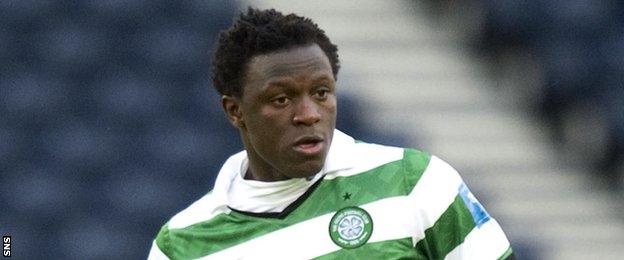
Wanyama joined Celtic from Belgian club Beerschot
"Come to us for a few years and you'll get your big move just like Victor," they could say.
Virgil van Dijk followed him to Glasgow, then Moussa Dembele. Odsonne Edouard might be the next to capitalise on time spent at Celtic Park.
Wanyama's capture was huge for Lennon for playing, financial and symbolic reasons.
The greatest night
In late October 2012, Celtic played heroically in defeat at the Nou Camp, only losing the Champions League tie to a late, late winner from Jordi Alba.
Two weeks later, Barcelona fetched up in Glasgow. They'd played 16 games that season - Lionel Messi had scored 17 goals - and only Real Madrid had beaten them. At Celtic Park, they started with Alba, Dani Alves, Xavi, Andres Iniesta, Pedro and Messi. They brought on Cesc Fabregas, David Villa and Gerard Pique.
On a night when Lennon's signing, Fraser Forster, put in a startlingly good performance in goal, Celtic won 2-1. Another Lennon signing, Wanyama, was so effective that he could have easily slotted into the heart of the Barcelona midfield instead. They had Alex Song in there. Wanyama routed him.
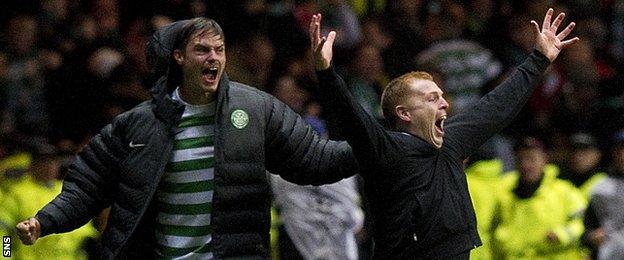
Mikael Lustig and Lennon celebrate Celtic's landmark win
The efficiency of the display was astonishing. The energy, the organisation, the concentration levels, the discipline and the clinical finishing was top class. It was a victory that went down in the annals and one that showed Lennon's tactical nous in slaying the biggest beast in world football.
They finished second in the group behind Barcelona but ahead of Benfica and Spartak Moscow. The Portuguese side dropped into the Europa League and went all the way to the final.
The signing of Virgil van Dijk
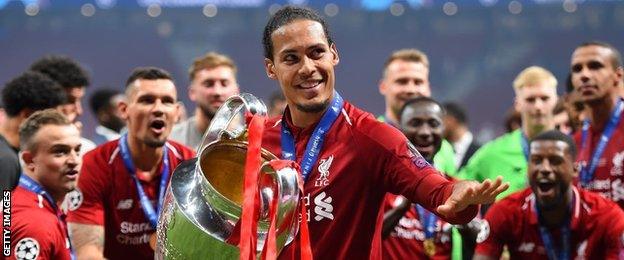
Van Dijk has won the Champions League with Liverpool since leaving Glasgow
When the Dutch defender was signed from Groningen for £2.6m in the summer of 2013, his athletic attributes stood out a mile. A graceful ball player, a guy who strolled through most games in the Premiership like he was playing in third gear.
He had his iffy moments in Europe under Ronny Deila, but for Lennon to have Van Dijk on his signings CV is a serious badge of honour. The Liverpool man is now the most expensive and almost certainly the best centre-half in the world. Celtic got a bucket of money for him when he went to Southampton and they got another bucket as a sell-on percentage from his £75m move to Anfield.
Lennon's detractors will cite Mo Bangura, Efrain Juarez, Derk Boerrigter and others as expensive errors but the signing of Van Dijk is the equivalent of a mic-drop moment.
The return
After three league titles, Lennon had enough of the gig and left in 2014. As Gordon Strachan used to say, everybody has a shelf life in that job and sooner or later the suffocating nature of it gets to you.
It's also true that most other jobs are a step down. The thing that is so hard to live with soon becomes something that is hard to do without. Lennon missed being Celtic manager. When the chance came to go back after spells at Bolton and Hibernian, he didn't need to think twice.
Again, there were doubts among the fans. They all loved him but when Lennon was given the job full-time last May, a fair chunk of the Celtic support were underwhelmed. They wanted somebody more in the Rodgers mould, only more loyal. Somebody shiny and new.
Like he did before, Lennon won them over. There's been pain - the exit from the Champions League and the wasteful failure against Copenhagen in the Europa League - but the team secured a ninth title in a row after the coronavirus pandemic led to a curtailed season and now the holy grail of 10 is on the horizon.
The future
Lennon's style of football is different to Rodgers' style, but it's no less effective domestically and it's had its moments in Europe.
Celtic's victory against Lazio in Rome was up there with the finest the club has achieved in the past 20 years and it wiped the floor with anything Rodgers managed on the higher stage.
They couldn't capitalise on it, but the fact remains that they went to the backyard of the second best team in Italy - a team who have already defeated Cristiano Ronaldo's Juventus twice this season - and beat them having already defeated them at home.
Lennon is a street-fighter (in the nicest possible sense of the phrase) but he's also more than that. Save for the odd aberration, he's shrewd and he's improving all the time.
Rangers might have thought that their prayers had been answered when Rodgers left, but Celtic managed to replace one formidable football man with another. And Lennon is not going anywhere, anytime soon.
